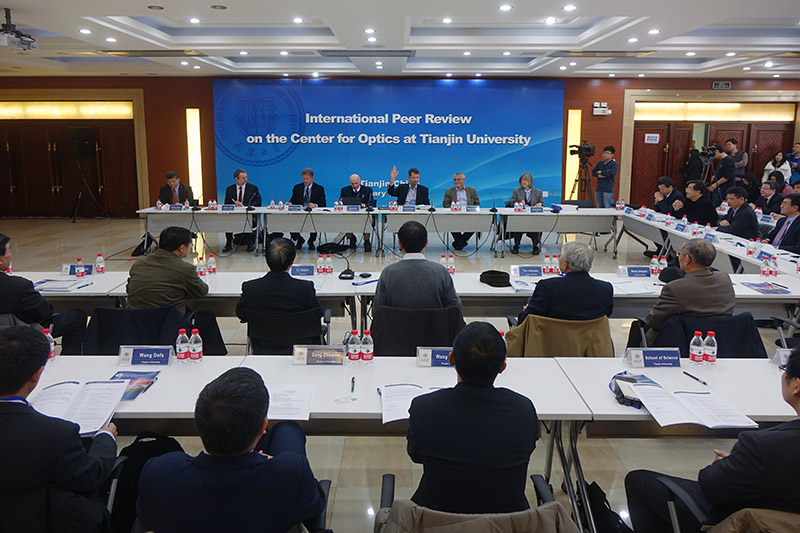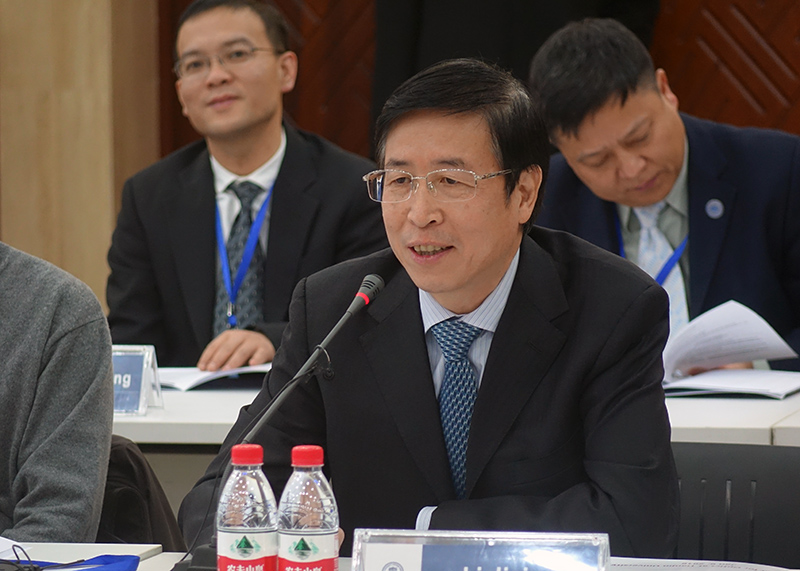

On January 6-7, 2016, Tianjin University was host to a number of internationally respected experts in optics who were selected from the United States, Japan and Europe. The experts were invited by TJU to participate in the international peer review of the Center of Optics (COTJU) as part of TJU’s strategies and aspirations to become a leading world-class university. Over 80 attendees, including Tianjin University’s President Li Jiajun, gathered for the International Peer Review (IPR) of the COTJU.
The director of the center, Professor Zhang Weili presented a comprehensive introduction of the COTJU after the opening remarks by President Li Jiajun. The IPR process involved a series of activities such as the presentation of teaching and research reports, lab and facility tours, and meetings with faculty and students.
TJU has been progressing rapidly over the last few years. In 2015, the university celebrated its 120th Anniversary and unveiled a new Peiyang Park Campus. COTJU opened a building in the new campus, which included an 8,000 square meters laboratories, offices and spaces to collaborate with other universities and companies.
Peer review is the basis of recognizing modern scientific endeavors. TJU was acknowledged as among the first batch of leading universities of engineering and technology in China to host aninternational peer review in the optical field, highlighting the importance of international cooperation in building and leading world-class centers and the delivery of disciplines taught. TJU and COTJU officials stressed this point, and used the occasion to promote the strategic plan for future development and dedicated to stimulating the cooperation with world-advanced center of optics and enhancing talents training.
The IPR Panel evaluated the current strengths and potential development in terms of research, education, international cooperation and strategic plan. The preliminary session summarized key conclusions of the IPR Panel and included the following:
Research capability was spoken about highly at the event, and the important themes of High-Quality Laser, Optical Communication, Optical Fiber Sensing, Photo Electronic Detection and Terahertz Photonics informed the IPR Panel about the current research and future objectives. “I think the center has (been) doing a very special and exceptional job in the area of terahertz research, I think the center is also doing some very good work on fiber lasers”, said the Co-chair of the IPR Panel, Professor Michael Bass, former Vice President for Research of the University of Central Florida, USA.
Tianjin University’s talent training system is already attracting widespread interests. For TJU, undergraduate and graduate education are important instruments in building the university’s global status. There is no doubt that graduating large numbers of students from COTJU will contribute to the center’s continuing development in attaining a world-class standard. Graduate students from the School of Precision Instrument and Opto-electronics Engineering were required to attend English seminars and journal clubs in various subjects to build and improve their language proficiency and knowledge about the subject matters studied. COTJU will continue to train students to have extensive knowledge across several disciplines as well as acquire specialized skills and abilities in the optical field.
The IPR Panel, Professor Zhang Xicheng, Director of the Institute of Optics of University of Rochester, USA also pointed out that it was a great contribution to not only train future researchers and professors, but also professionals for companies and organizations, and future entrepreneurs. The professors of COTJU will collect and publish the data of employment and offer significant guidance to students on how to pursue jobs both inside and outside academia.
A conclusion was reached that TJU is traditionally strong in technology and engineering, The IPR Panel advised TJU to build a comprehensive university by promoting science disciplines in future development. It was suggested that COTJU collaborate with progressive institutions and organizations at home and abroad, as well as communicate their findings to the public. Professor Zhang Xicheng Zhang pointed out that it was better to be the best in one or two fields rather than been exceptional in many areas.
There are many new discoveries from the COTJU and which can be commercialized; transforming research into industry needs will be the goal in the future.
"We suggest that the center focuses in the area of optical science, and we suggest that the ideas of becoming more well-known internationally cab eventuate by hosting conferences, by sending people to different conferences around the world, and having visitors from TJU go to places for intense studies and visits.” Professor Michael Bass said.
"I was most impressed by the faculty and students who seemed enthusiastic and committed to the work they were doing, I think the equipment and facilities are excellent”, Professor Michael Bass said. “Some of the work in freeform optics seems to have some leadership and unique aspects; the work on fiber sensors appears to probably be the most prominent within China. I personally like some of the work on space division multiplexing, that’s very competitive” added the Co-chair of the IPR Panel, Professor Andrew M. Weiner from Purdue University, USA.
IPR is more than an avenue for feedback from the experts. It was constructed to demonstrate Tianjin University’s ambition of becoming a leading world-class university. The Center for Optics at Tianjin University has been excellent at showcasing its international contribution, from establishing the Key Laboratories to publishing scientific papers. The international peer review is just another indication of the university’s ambition of becoming a leading world-class university.
In line with the recent feedback from the IPR panel, TJU encourages its faculty members to engage in future cooperation.
An official said this event played an important role in the center’s development. In addition to contributing to the COTJU consultations for this event, TJU took advantage of this occasion to promote the structure of disciplines, integrate the delivery of multidisciplines, advance the scientific and technological innovation system, and frame a leading world-class discipline.
The IPR Panel including:
Professor Michael Bass:
(Co-chair of the IPR Panel)
Professor Emeritus, College of Optics and Photonics
Former Vice President for Research
University of Central Florida, USA
http://www.creol.ucf.edu/People/Details.aspx?PeopleID=293
Professor Andrew M. Weiner
(Co-chair of the IPR Panel)
Scifres Family Distinguished Professor of Electrical and Computer Engineering
Purdue University, USA
https://engineering.purdue.edu/ECE/People/profile?resource_id=2806
Professor Robert A. Norwood
Professor of Optical Sciences
University of Arizona, USA
http://www.optics.arizona.edu/research/faculty/profile/robert-norwood
Professor Hitoshi Ohmori
Chief Scientist, Director of Ohmori Materials Fabrication Laboratory
Independent Administrative Institution RIKEN, Japan
http://www.asi.riken.jp/en/laboratories/chieflabs/materials/
Professor Claude Parick Fabre
Laboratoire Kastler-Brossel
University Pierre and Marie CURIE, France
Former President of the French Optical Society
http://www.lkb.ens.fr/-Fabre-Claude-?lang=en
Professor Michael (Misha) Sumetsky
Professor of Photonics, Aston Institute of Photonic Technologies
Aston University, UK
http://www.aston.ac.uk/eas/staff/a-z/professor-misha-sumetsky/
Professor Xi-Cheng Zhang
M. Parker Givens Professor of Optics
Director of the Institute of Optics
University of Rochester, USA
http://www.optics.rochester.edu/people/faculty/zhang_xi-cheng/